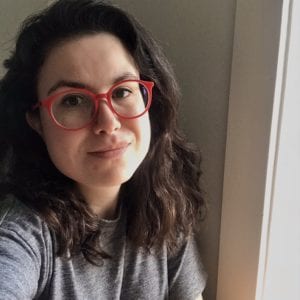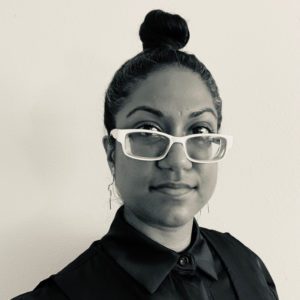Three astonishing new interns have joined the Press this spring—remotely, from around the country—and it’s our pleasure to introduce you to each of them here. We’ll share their 60-second Q&As every #MeettheInternMonday in the coming weeks, so check back!
P.S. Interested in an internship with us in Summer 2023? Applications are due March 1. Learn more.
Meet Elizabeth
 CCP: What’s your favorite aspect of the intern experience at Copper Canyon Press so far?
CCP: What’s your favorite aspect of the intern experience at Copper Canyon Press so far?
E: It has been a joy to witness and share in the effortful carework of a small, nonprofit press. All departments, from finance to marketing to production, demonstrate a deep regard for poetry and center Copper Canyon’s far-reaching community of poets and readers. The staff has welcomed me with this same generosity and goodwill, supporting my learning with meaningful, substantive projects. I feel so fortunate to be among advocates for poetry and to help sustain the craft that has sustained me.
CCP: Please tell us about a forthcoming Copper Canyon title you’re excited about, and why.
E: I am so looking forward to Robin Myers’s mesmerizing translation of What Comes Back by Javier Penalosa, forthcoming Spring 2024.This multi-narrative collection pursues the ephemeral lost: rivers dried up, communities left behind, memories forgotten. Subtle tensions underlie Penalosa’s gentle images and unassuming syntax: a river stays in place as it flows away; a door permits and bars entrance. The story moves—like light reflecting off a churning water—in surprising and unpredictable ways.
CCP: Please give us a line from a poem that you can’t get out of your head.
E: Since I first read Jenny Xie’s Eye Level, I haven’t stopped thinking about the lines: “At present, on this sleeper train, there is nowhere to arrive. / Me? I’m just here in my traveler’s clothes, trying on each passing town for size.” Xie’s characterization is swift and moving: the speaker unsettled and aimless, the interrogative “Me?” relegating her to afterthought.
Meet Jay
 CCP: What’s your favorite aspect of the intern experience at Copper Canyon Press so far?
CCP: What’s your favorite aspect of the intern experience at Copper Canyon Press so far?
J: From day one, it has been such an immersive experience: diving immediately into the writings of poets, working closely with staff, and learning so much about each stage of the poetry publishing process. My favorite part has been when we come together to strategize further ways to nurture our poets, readers, and those who work behind the scenes to produce books of poetry. Every interaction is rooted in this deep sense of community and as a marginalized writer, it has been an honor and of such importance to me to be around this strong bond.
CCP: Please tell us about a forthcoming Copper Canyon title you’re excited about, and why.
J: Niki Herd’s The Stuff of Hollywood forces you to reckon with the camera as an omniscient eye shaping the national narrative on gun violence and police brutality. Reading through these poems, I felt I became the camera itself, documenting the interplay of religious and political discourse, witnessing the truths of events, but simultaneously becoming an instrument to be manipulated. In their incisive second poetry collection, Herd reveals the camera to be a part of the shadow play evocative of Hollywood, in the ways it may be used to misconstrue information through misdirection, distraction, and profit.
CCP: Please give us a line from a poem that you can’t get out of your head.
J: Christopher Soto wrote, “Dear police / Trust means I give you the gun / You don’t shoot / It’s not something you deserve / To be trusted” in his 2022 poetry collection, “Diaries of a Terrorist.” I find myself coming back to these words often as I consider my brownness, my queerness, my gender fluidity daily, in the mirror, in my writing and in the lives of loved ones. Their words are a reminder to me that even in moments where I feel powerless, vulnerability is still a means of activism and resistance.
Meet Ivy
 CCP: What’s your favorite aspect of the intern experience at Copper Canyon Press so far?
CCP: What’s your favorite aspect of the intern experience at Copper Canyon Press so far?
I: I previously believed that publishing was a silent, solitary career. And sure, certain aspects, like copy editing or proofreading, require undivided focus, but what I’m learning from my experience with Copper Canyon Press is how much of publishing is built on relationships. The Press’s team is tight-knit and well-connected, and nearly every part of the process is a hands-on effort. It has to be: to engage diverse communities in the pursuit of poetry, we have to approach from a committed, diverse, communicative community. It’s unbelievably exhilarating to now include myself in that “we”!
CCP: Please tell us about a forthcoming Copper Canyon title you’re excited about, and why.
I: I am very excited about Lisa Olstein‘s Dream Apartment. As I develop as a poet, I find myself more and more magnetized by writing that displaces my understanding of the genre. When the only tool I have to create poetry with is language, I want to know how much I can aggravate form and/or content and have it still be recognized as poetry. Olstein’s experimentation with images, metaphors, sounds, and elements challenges and thrills me. It is lyrical and strange and pure poetry.
CCP: Please give us a line from a poem that you can’t get out of your head.
I: A couple weeks ago, I read Jane Miller‘s August Zero. After devouring it, I promptly set it down beside me and evidently into the void, as I have since been unable to find it, which I am wont to do, but still one line in particular has haunted me: “There are more important things to endure / than one’s own darkness.” I love the open-endedness of Miller’s wording. We will, of course, endure other darknesses not our own—but also, what bright lights will we endure? Is pleasure not also a sort of patient suffering when one is accustomed to heaviness?